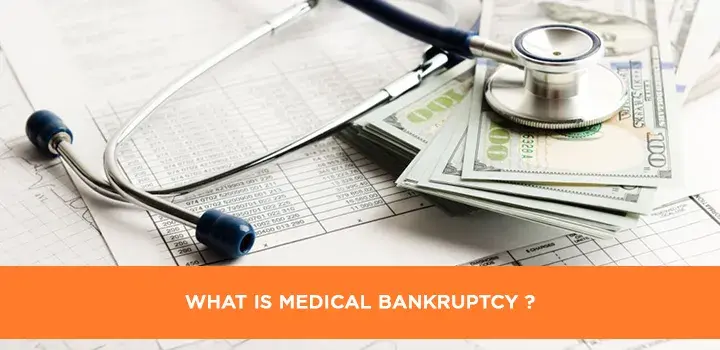
Medical bankruptcy is the official legal procedure of declaring bankruptcy brought on by medical expenses. More than one-third of Americans find it difficult to pay for their medical costs, they run the danger of medical bankruptcy.
Anyone may become medically bankrupt regardless of their wealth or degree of health. About twenty percent of Americans seeking personal bankruptcy are those suffering from a chronic sickness or handicap.
Usually, medical bankruptcies result from people running into debt from doctor visits, hospital stays, prescription medicines, and other healthcare expenditures when they lack money saved for their bills.
What does medical bankruptcy mean?
The inability of someone to pay for medical expenditures is referred to as medical bankruptcy. A sickness, accident or any other unanticipated financial crisis that keeps you from making your payments might all lead to it.
Medical bankruptcy might seriously affect your way of life. Even if it means living in your vehicle and depending on charity, you might be compelled to sell your house and other belongings to make ends meet.
The good news is that your life narrative does not always finish with medical bankruptcy. You may prevent this by getting in touch with credit counseling services or a debt reduction agency, among other avenues.
Can you discharge the medical debt in bankruptcy?
In rare circumstances, a debtor may dismiss the medical obligation by declaring bankruptcy. Still, the procedure is complicated and calls for a lot of effort and documentation.
Only in bankruptcy would medical debt be released if the debtor can demonstrate their inability to pay. The debtor has to prove that they have tried to pay back their obligations but have not been successful if this is to occur.
Before declaring bankruptcy, make sure you know your alternatives if you are having medical debt.
Which type of bankruptcy should you file for medical debt?
A rising issue in the US is medical debt. Medical debt reportedly accounts for around $200 billion in unpaid invoices.
Chapters 7 and 13 are the two most often occurring forms of bankruptcy. While both have some benefits and drawbacks, before declaring bankruptcy you should take great thought on many other elements.
Since Chapter 7 bankruptcy lets people instantly eliminate all their debts—including credit cards, school loans, and mortgages—it is the most often used kind of bankruptcy among those seeking medical debt. It does not, however, let people retain their belongings or exclude anything from their obligations.
How to file Chapter 7 bankruptcy for medical debt?
Among the most often occurring forms of bankruptcy in the United States is Chapter 7 bankruptcy. It releases individuals from their responsibilities and lets them seek debt relief.
You have to have debt—either secured or unsecured—that is not subject to payback to petition Chapter 7. Your credit card debt may be paid back, hence it is not qualified for this kind of bankruptcy.
Filing Chapter 7 might be your best choice if your medical costs are unmanageable; nevertheless, there are several things you should be aware of before starting the process.
How to file Chapter 13 bankruptcy for medical debt?
A Chapter 13 bankruptcy is a kind of restructuring wherein debt may be paid back over three to five years for those declaring bankruptcy. Many times out of reach for most people, the repayment schedule might assist those with medical debt.
For both individuals and households trying to manage, medical debt may be among the hardest kinds of debt because, if improperly managed, it has major repercussions. You have to have an annual gross income of less than $12,560 or an average disposable income of less than $360 per month to qualify for Chapter 13 bankruptcy.
Alternatives to filing medical bankruptcy
For many Americans, medical bankruptcy is a brutal reality. Making this kind of decision may be challenging, hence it can be much more so after you have no other alternative.
Negotiating with creditors and completing debt management programs are two other choices than declaring medical bankruptcy. Though they are not ideal, these substitutes provide a chance to prevent the worst-case medical bankruptcy situation.
For many Americans, medical bankruptcy is a brutal reality. Making this kind of decision may be challenging; it can be even more so when you have no other option. Arranging with banks and completing obligation administration programs are two other choices than announcing restorative insolvency. Though they are not ideal, these substitutes provide a chance to prevent medical bankruptcy—the worst-case situation.
Call on (888) 803-7889 for free credit consulting services.
Resources
When credit score updated?